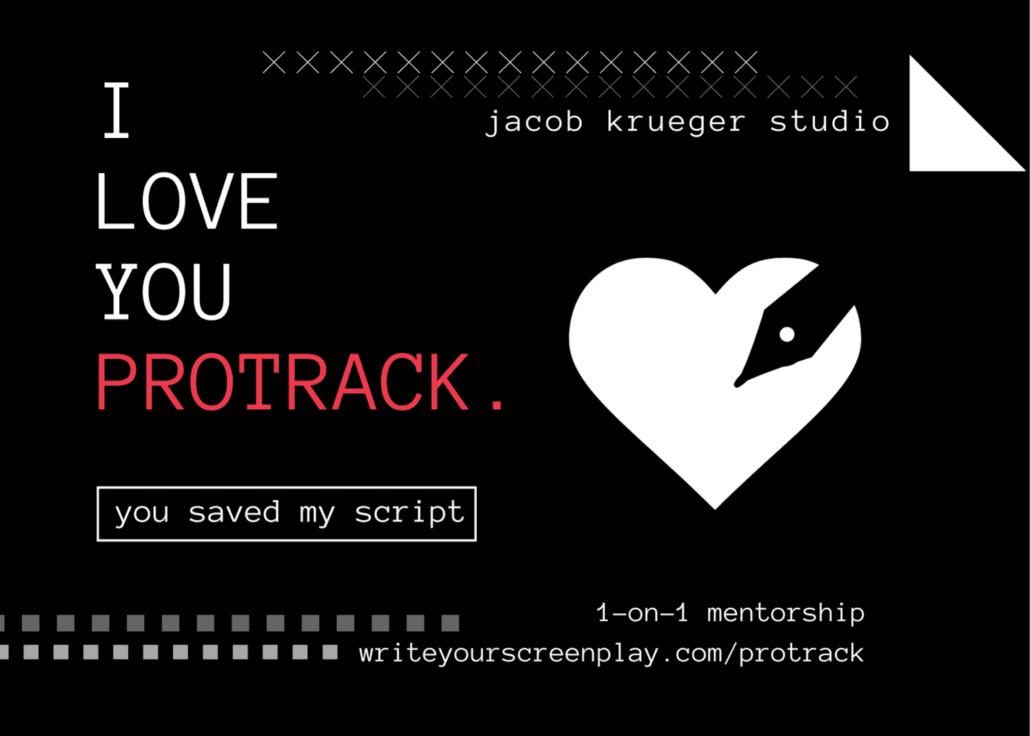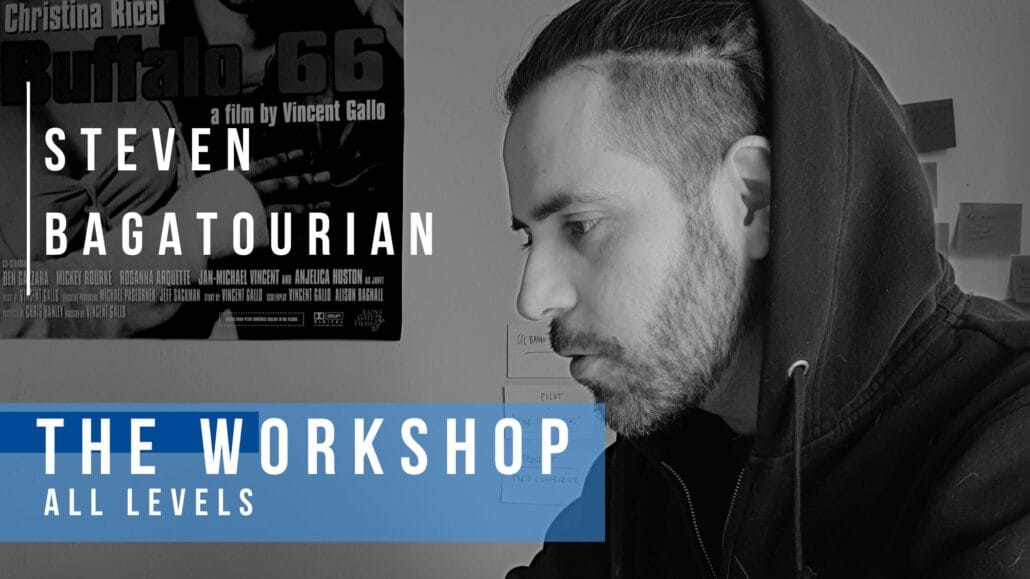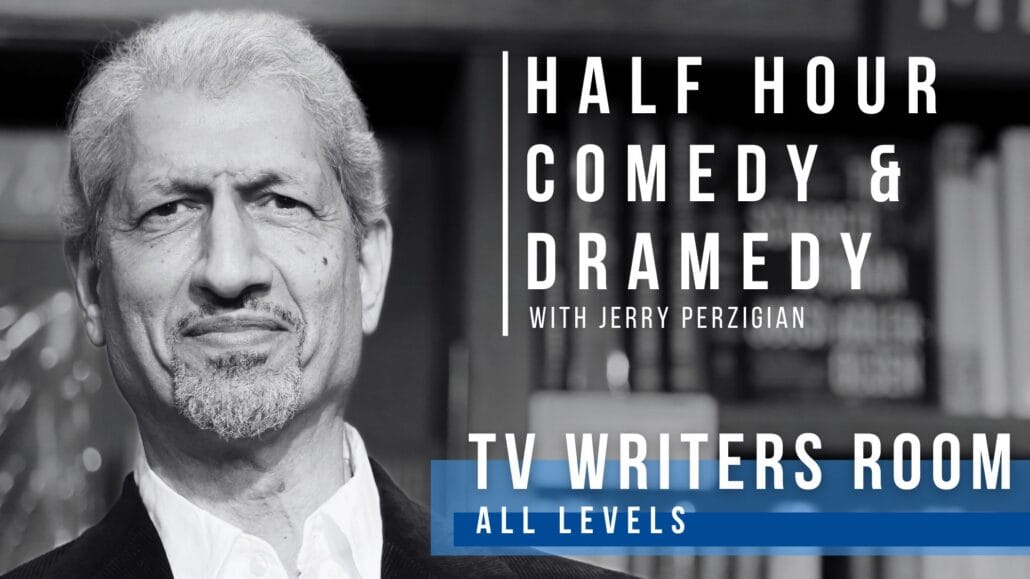4th Annual Pitch Festivus!
This week, instead of our normal programming, we’re going to be bringing you a replay from our 4th Annual Pitch Festivus! event. We’ll begin with a roundtable where you learn pitching and get answers to common questions from Jacob Krueger and top members of the Jacob Krueger Studio faculty, Steven Bagatourian, Jerome Perzigian and Christian Lybrook. Then you’ll hear a series of pitches from members of our community, and feedback from me and my faculty members, so you can learn how to make your own pitches better and succeed in this challenging industry.
And before we get started, congratulations to our winners:
The Audience Choice Award went to J.D. Elliby for “The Kingmaker.”
The Faculty Choice Second Place Award went to Fred Mazyck for “The Pain Reliever.”
The Faculty Choice Grand Prize Award went to J.D. Elliby for “The Kingmaker.”
The Pitch Festivus! Pitching Panel

Award Winning Indie Screenwriter, TV Writer and Producer, with work featured at Tribeca Film Festival and SeriesFest.
Q: Why does pitching terrify me?
JERRY PERZIGIAN (ProTrack, TV Comedy Writer’s Room) Everybody’s afraid! Not only afraid to pitch but also afraid to face that first blank page. And no matter how much success you may or may not have had in the past, each new venture is intimidating. It’s scary. And everyone is insecure. It’s normal to have fear. That’s why I strongly advise practice, practice, practice.
Just sit, practice it alone, practice it at Starbucks, practice it with your friends until they get sick of hearing it. You’ll see what lands and what doesn’t work. And then little by little, you’ll gain confidence in your premise, in your delivery of that premise, in the places where you stop and wait for a laugh or a reaction and the places where you bring more energy – and you’ll get less afraid.
Just remember that we’re all in the same boat. When you see an executive that’s pompous and intimidating, that person is scared too. Being seen in that way is their protection. So we’re all in the same boat.
JACOB KRUEGER: (Write Your Screenplay, Write Your TV Series, Master Class, ProTrack) There are three antidotes to fear, which I can share from personal experience. When I was in my early 20s, when my career was happening, I had the most intense social anxiety you can imagine. It isn’t that I was afraid to pitch, I was afraid to talk. I was afraid to look somebody in the eye. I had absolutely crippling anxiety. And I think it’s important to know that, because if you know me, you wouldn’t guess that today.
So first, practice– but do it in a low-stakes environment. Don’t let your first pitch be a meeting with an executive in a fancy office. Make your first pitch at a bar to somebody too drunk to remember whatever the hell you said. Get into the water slowly and then gently turn up the heat. The more you practice, the less terrifying it becomes.
The second key is to breathe. Every time you get nervous, take a breath. When you do that, you start to control the room. You start to actually feel more confident. But also you start to exude confidence to other people, and they start to perceive you as more confident. So breathe.
You can also use some NLP (Neuro-Linguistic Programming) stuff. You can mirror people. Particularly if you’re live, it’s easy. I’m not going to follow the person like crazy. But I’m going to gently find their movements. When you do that, they start to instantly like you.
But also, I start to feel what it must be like to be them.
Mirroring builds empathy. Oh, he’s bored. Oh, she’s uncomfortable. I can start to feel what they’re feeling. And that feels safer for me.
The third key is: Don’t fucking sell!
And that’s the hardest piece for people to understand, because the whole point of a pitch is to sell your script, right? We all want to sell our script.
Don’t fucking sell. This was the thing that opened it up for me. I was so anxious about selling, about being liked, about saying something smart, about being judged.
But I wasn’t anxious when I thought about helping people. I always wanted to help people. And I was always comfortable when I was helping people.
So, your pitch is actually helping somebody. They’re in desperate need of your idea. Because they don’t have it. If they already did, they wouldn’t be wasting their time talking to you. You’re actually helping them. If you think of your pitch as an answer to a problem, it’s a lot easier to feel safe.
CHRISTIAN LYBROOK (ProTrack): We have this belief: This is it, this is the shot. That puts a lot of pressure on us. But the odds are, if you’ve gotten one pitch meeting, that means people are interested and you’re going to get more than one shot. So don’t go into it thinking everything rides on this one meeting. You’re just going in there to make friends.
Q: What are some things you should never do in a pitch?
STEVEN BAGATOURIAN (The Workshop, ProTrack, Write Your Screenplay): Don’t get too clever. Don’t try to be the smartest guy in the room.
In one of my worst pitches ever, I opened with a kind of deep philosophical treatise on the nature of language and the history of speech. It was a long philosophical lecture that I thought was fascinating. It was kind of obliquely connected to the story, but I was pitching on some sort of metaphorical level. By two minutes into my brilliant lecture, everyone had completely checked out and were now actively hostile to anything else I was going to say.
So don’t be some genius. Just walk in there humbly and excited to tell a good story. Pretend you have a bunch of people around the campfire and you have a great story to tell. It’s not about you and how smart you are, it’s not about impressing people. You just want to get people excited, to see their eyes light up about something really cool that they can engage with.
On a lot of levels, pitching is a lot simpler then we build it up to be, because once you’re in the room, you’re just around a modern day campfire. All these executives have boring lives and boring jobs in large part, and you get to be a bright spot in someone’s day.
If you can tell a great old fashioned story around the family dinner table, pitching to an executive is really no different. It’s just being able to hold people’s attention and go from strength to strength in a cool story without wasting a ton of time on boring, unimportant stuff (like long histories of the origins of language and human consciousness!)
JACOB KRUEGER: See, even the people you look up to make terrible mistakes and survive them. Don’t be so safe that you don’t do the pitch you want to do. Don’t be so safe that you never make a mistake. You’re going to learn from your mistakes, and you’re going to grow. And as long as you’re not a jerk, you’re going to have other chances to pitch.
CHRISTIAN LYBROOK: Christopher McQuarrie (Mission Impossible, The Usual Suspects) said, “Information is the death of emotion.” And emotion is the only reason we care about stories. Our job as a writer is to create an emotional experience. So if you find yourself focusing on biographical details– this happened and this happened and this happened – that’s a signal for you to take a step back and ask, How can I create emotion in these moments?
JERRY PERZIGIAN: I would add, don’t go past yes. Or no. Once you get a yes, don’t keep pitching the stuff you forgot. That just gives them room to disapprove. But don’t go past no, either. If you see that they’re not interested, don’t desperately flounder, don’t try to jam through an idea that you see is not landing. Sometimes it doesn’t land and you just take your lumps and move on to the next one. Maybe you have another idea for that same meeting. Or maybe you have to get another meeting somewhere else. But don’t don’t go past yes or no.
JACOB KRUEGER: That’s one of the things that took me a while to learn, because I used to be the guy who tried to fight through no. Because I like arguing, I always thought, Well, of course I can answer their objection. And what I actually learned was to read their faces.
If I’m pitching Christian and he makes an unhappy face, I’m going to call him out, nicely. “Boy, Christian, this is not the story for you, is it?”
What I just did was to honor our human relationship.
If you were out with your friends and you started to tell a story and you got a bored look, you would figure that out. Oh, I guess that was boring. So one of the things I learned was to actually call it out. And when you do that, everybody just sighs in relief.
Christian doesn’t have to listen to another 10 minutes of something he’s never going to buy. And I don’t have to spend another 10 minutes banging my head up against the wall. And we just honored each other’s humanity.
I could then say, “Great, this isn’t for you. What are you looking for?”
And now I’m back to helping. Maybe I have the kind of thing he’s looking for and I can pitch that instead. If I don’t, I might say, “I’m probably not the right screenwriter for you, but could I pick your brain for a moment?”
That line– Could I pick your brain for a moment?— is the most valuable line you will ever have.
If someone says “no” to you, turn them into a mentor. (Unless they’re a jerk. Don’t let any jerks into your life, I don’t care how famous they are.)
“Can I pick your brain for a moment? OK, I know this script is not for you, but I also know it’s like these other scripts that made a lot of money recently. It has great roles for these actors. And the script is really ready. Who would you bring it to?”
And at this point, Christian’s probably going to say, “You know what, send it to me.” Because if it’s that good, he doesn’t want to lose out. And he’s thinking, “Well, I could just send it to Keanu.”
Or if he says, “I don’t know,” you can say, “Christian, whatever you know is so much more than a baby little writer like me knows. You got this movie made, you got that movie made. What would you do if you were in my shoes?”
And then I’m going to shut up. And Christian’s eventually going to say something like, “I don’t know, maybe bring it to so and so.”
And then I’m going to get my ask. “Hey, Christian, can I ask you for an introduction? Could I mention your name when I call?”
And if he says yes, now I’m a warm call, not a cold call. If he says no, I’m going to say, “OK, thank you so much for your time, Christian.” And if he says yes, I’m going to say, “Thank you so much for your time.”
See, I’m still not going past the yes. “It means so much to me to have a mentor like you. That someone at your level would take the time for somebody like me. I’m going to email you and let you know how it goes.” You see, I just made him a mentor, and I just set up my next contact with him.
I just turned him into a fan of Jake Krueger as opposed to the guy who’s pissed off because he had to spend all this time saying no. So make them your mentors. Every bad meeting is an opportunity to build a network of people who become your champions.
Q: What are comps? What do they bring to a pitch? Do you use them or not? What’s the best way to use them? And is it okay to use old comps?
STEVEN BAGATOURIAN: In Hollywood terms, people often pitch a project as “this meets that.” It’s a Wonderful Life meets Die Hard. Or Armageddon meets A Fish Called Wanda. It’s a shorthand way to give an idea of what general ballpark your movie exists in.
Now when I first got into Hollywood, I thought this was silly because I wanted people to realize that everything I was writing was just so highly original, there was no point in trying to give comparisons. But I came to realize that people ask for comps for a couple of different reasons.
The most obvious reason is that it’s very, very difficult for people to imagine the tone of the story that you’re writing. And since they don’t trust you to represent the tone in a florid sentence or two that describes what it feels like, they’re just asking you to mention another cinematic experience, or a TV experience, that your thing feels like.
So, if they love the comedy in A Fish Called Wanda or if they love the action in Armageddon, they get a sense for the general ballpark that you’re landing in.
The other reason they’re asking for a comp is they want to be able to say to their boss or their fellow executives that the thing you’re pitching has some iota of commercial value. And so they want to know that it compares to something else that has made money.
That’s why you must only reference comps that have made money. If you compare your film to something that has lost money, that’s like walking into an investment meeting comparing your business idea to a couple of failed businesses and then expecting them to back up the Brinks truck to your house. It’s not going to happen.
So you reference highly successful movies or TV shows and dance between the raindrops and pitch your project somewhere in the middle.
But also be careful that you’re referencing something that people would have some chance of having seen. Don’t reference the successful Hong Kong action movie from the early 1980s, just to prove that you’ve got indie cred, because the executives are just going to give you a blank stare. So reference successful films and TV shows that a normal human might have seen and that made a lot of money.
Old comps can work great. If you can use something like It’s a Wonderful Life, I think that’s terrific but you need to combine it with something contemporary,
CHRISTIAN LYBROOK: You don’t want too many comps, though. If you have a laundry list of references, that may communicate that you don’t know what your movie is. Two strong comps should be plenty.
If you’re going to do “this meets that,” you’ve got to make sure that those two comps are different. If you pitch No Country for Old Men meets There Will Be Blood, those are sort of the same thing. You want to look from the outside in. Help the executive looking at the project from the outside to see what it is.

JACOB KRUEGER: When you say “this meets that” you want to see people’s eyes light up. Otherwise, you might as well not have a comp because your comp’s not doing any good. And that’s actually more important than “Am I pitching a TV comp for TV? Am I pitching feature for feature? Is it old? Is it new?”
You’re always going to get conflicting advice the moment you step into a meeting with development executives. Development executives are not all the same person. And by the way, they’re not all good at their jobs. Just because they’re an executive doesn’t mean they’re actually good at their job. And it doesn’t mean that their feedback is correct.
Personally, I don’t like comps. I like crafting a pitch in such a way that the person gives me the comp. Where they’re suddenly saying, “Oh, it’s this means that!” And then at the same time, I’m always going to have my comps in my back pocket, because some producers really, really like them. And if they want them, you better have them.
You could also give a comp with a twist.
Right now, I’m working on a piece called The Amateurs. It’s basically Ocean’s 11 if everyone sucked at their jobs. You don’t need another comp– you already got what it is. You got what the tone is. It’s funny, it’s going to have the action and the adventure and the heist sequences of Ocean’s 11. You might be pitching yourself that it’s Ocean’s 11 meets Dumb and Dumber. I didn’t have to give you Dumb and Dumber for you to get it. I just gave you a twist on an iconic film.
Q: What’s the best strategy to get a manager or an agent? How do you find producers or production companies and executives to pitch to? When should you be thinking about representation?
STEVEN BAGATOURIAN: My answer might be slightly annoying to some writers but I think it’s a true and useful answer. The vast majority of writers who are looking for representation are not, in fact, ready to be represented. It’s just a giant waste of time to send out scripts that are not really up to snuff.
If you want to get a manager or an agent, just become highly obsessive about your craft. Become highly obsessive about writing not just a good script but a great script. Become obsessive about pushing yourself to become a fantastic screenwriter.
I believe that when someone crosses a certain threshold and has written a great script, it’s incumbent upon you, as someone who has any connection, to help.
And so anytime a student of mine writes a script that I think actually deserves representation, I’m the first one to offer to send it to my manager or some useful person I know, because I see that they’re ready. And I know that it would be worth sending.
What I’ve found is if you really focus on your craft, your work will do the networking for you. And the more you get your scripts out there, the more people will want to help you– if they read a script that they think is truly great.
But if you’re not writing really great scripts, then you don’t have any business wondering about managers or agents. You should just be focusing on craft, craft, craft. Because once you get in that ballpark, managers and agents will suddenly pop up in your life. Things will start happening that will bring them into your life.
As an example, I have a ProTrack student who just got a 9 on the Blacklist. The same day he got that 9, an agent from CAA (Creative Artists Agency) emailed him. He’s been trying to get an agent for years. But now that he’s got a 9 on the Blacklist, CAA is contacting him.
So really, he just kept his nose to the grindstone for the last two years, writing and writing and writing. He’s been working on the same script with me for two years. And he’s finally starting to get attention for it. But he has been just a madman about his craft. Week in and week out, he’s been obsessing over every single scene.
In my experience, it’s that kind of focus that can catapult you into a place where reps are looking for you. Rather than running around the digital town with your hat in your hand, sending out emails to 200 people, waiting for someone to discover you – just write a great script and put it out there.
The world can change for you if your craft is at the right level. That’s my experience.
CHRISTIAN LYBROOK: I live in Idaho so I have to work extra hard. That means I have to put a lot of time and energy into creating relationships. So while you’re working really hard on your craft, we can also start to create those relationships and really create community. Go to film festivals, start meeting people that are at your level, start mentoring people who are maybe just a little bit below you, because everybody’s going to rise together. Put some focus on that stuff as well. But Steve’s right. You cannot underestimate craft. Good is not good enough.

STEVEN BAGATOURIAN: There’s nothing you can do that will accelerate your craft faster than becoming part of a peer group of serious-minded, focused writers. Whether you’re in Idaho or Germany or the Virgin Islands, wherever you are, these days it’s easier than ever to find a group of people to have a zoom session with every couple of weeks and just workshop pages. Find your tribe, find a peer group to work with. That’s how you get better fast as a screenwriter.
That’s actually one of the things we do here at the school that I’m most excited about. The workshops that we offer are basically writers groups, where we get a bunch of people in a room every two weeks and we table-read pages and we all critique each other. I think that’s a fantastic way for writers to grow and learn from each other.
JACOB KRUEGER: All of networking is finding your people. Probably the reason I used to be so nervous was I used to try to get people to do something for me. That’s not it. It’s finding people you vibe with, people you like, people whose art you find interesting, people whose conversation you find interesting.
Producers feel the same way. They don’t want to buy a great script from an asshole if they can avoid it. They’re going to be spending years developing it with you, They want to like you, and not everyone’s going to like you. And you’re not going to like everyone.
The other thing you can do right now, if you’re not represented, is go to film festivals. Go to good film festivals. I just got back from the Austin Film Festival, which is one of the best film festivals out there for writers, where you can just go hobnob with the greatest writers in the world. You can just talk to them.
Go to Sundance. Go talk to the producer of your favorite film after you’ve seen it. Become their friend. You’re looking for the people who are one degree above you. And you’re also looking for the people who are one degree below you. “Hey, let me show you how you do that.” Because five years from now, that person’s a development executive. And they’re going to remember that help. So you want to find your people and you want to invest in them. And that’s what’s going to do it.
And honestly, you don’t want a frickin’ agent until you have a library of scripts. Let’s say you pull off the miracle, which probably means you spent two years of your life doing nothing but getting an agent. Somehow you pulled off the miracle, and even though you didn’t sell the script yet, the agent somehow signed you. (Which rarely, rarely happens. Usually, it’s the other way around. Usually you sell your script, and then you get whatever agent you want.)
You have one script, and what’s going to happen is, for one second, the agent’s going to be like, “Oh, you are my sexy new client, tell me all about you.” And you’ll say, “Well, I’m working on this new thing.” And your agent’s going to say, “OK, reach out when you’re done.”
And three months later, six months later, when you’re done, you’re going to reach out, and they’re just going to be like, “Who the hell are you?” Because for all that time, they couldn’t make any money on you. To even just get you work, they need two writing samples that kind of tell a story together about who you are as a writer.
So put your focus on building your library of scripts. They don’t have to be the same genre, but they need to tell a story together about who you are as an artist. They all need to be of the same high quality. You want three, four, five unbelievable scripts.
Then when you get signed, your agent can immediately get you writing gigs. Your agent can make money on you. And if they make money on you, they invest in you. If they don’t make money on you quickly, they forget about you. And now you’re just searching for another agent. You’re just back in that same circle again.
Q: How do you pitch in a TV writer’s room? When do you speak up? What is the showrunner looking for when you’re pitching a contribution to a story the group is creating together?
JERRY PERZIGIAN: Obviously, it first of all has to fit the theme or the premise of the show and service the characters of the show as it exists.
When I got to Hollywood in the 80s, someone told me: Whatever is personal, is universal.
There was a guy who produced Everybody Loves Raymond– he ran that show so efficiently that people went home at a reasonable hour to have dinner with their families. I never heard of such a thing in TV. But one of his stipulations for being able to go home at 6:00 was that the writers had to pick a fight with their significant other, and then tell the room about it in the morning, so the room could play around with it and see if they could turn it into an episode. He literally required his people to have domestic battles at home and then report about them at work because that’s what that series was.
Whatever is personal is universal, is how I would start. If you’re pitching in a room, you don’t always need the resolution. You just need the predicament and then maybe the obstacle to that predicament – because in television, nobody does it alone. It really is a group effort. Always.

I grew up in Chicago– I knew nothing about TV writing. And I had all kinds of preconceptions about how it was going to be. And then you get there, and you learn how it really is. And it’s easy to get lost. That’s why my TV Comedy Workshop is run like a real writers room, so we can de-mythologize some of this stuff. So when you get there, you won’t be lost. You’ll be like, “I can speak to this schmuck, cause I’ve already done it!”
Comedy by definition is surprise. A punch line is a surprise. So if you’re just thinking linearly in one direction, it’s not going to be as funny as if some pot-smoking knucklehead in the room says, “Well, what about this instead of that?”
So you don’t always need the full episode worked out. But you have to give the pot-smoking knuckleheads something to work with and something to think about. So start with something personal.
Keep a notebook. You think you’re going to remember when something quirky, idiosyncratic or weird or odd happens, but you don’t remember it as vividly as you think you will.
Larry David had these dirty, old grimy wire notebooks, filled with stuff that happened. I’m sure he saw somebody eat half a grapefruit and get squirted in the eye. And then it became an episode of Seinfeld. I’m sure of it.
That’s another aspect of Whatever is personal is universal. Keep track of it. Keep a record of it.
And then lastly, I’ll say don’t be afraid to make an ass out of yourself. Because if you are reticent and quiet, especially in comedy, you will be marginalized and nobody will pay attention. But I tell my staff, the opposite of the stupidest idea in the world is the smartest idea in the world.
So even if you tell me the worst piece of shit, if I flip it around, it becomes the best thing. So you’re contributing even if you say something dumb. So don’t hold back. Try to be personal and imaginative.
CHECK OUT THE EXCITING PITCHES FROM PITCH FESTIVUS BELOW
Pitch 1 by J.D Elliby “The Kingmaker”
Pitch 2 by Fred Mazyck “Pain Reliever”
Pitch 3 by Helen Gleason “Cloud Nine”
Pitch 4 by Renee Short “Perfect Faith”
Pitch 5 by Sean Meagher “Eco Quest”
Pitch 6 by Marco Aguilar “Kung Fu Puerto Rican”
Pitch 7 by Kenny Kozlowski “Grampa’s Cursed Pipe”

I hope that you enjoyed this podcast. If you are getting a lot out of it and it’s helping your writing, come and study with us. We have a free online class every Thursday night, foundation classes in screenwriting and TV writing, a Master Class for those of you who want a grad school education at the tiniest fraction of the cost, and a a wonderful ProTrack mentorship program that will pair you one on one with a professional writer, who will read every page you write and mentor you through your entire career at less than you would pay for a single semester of grad school.







